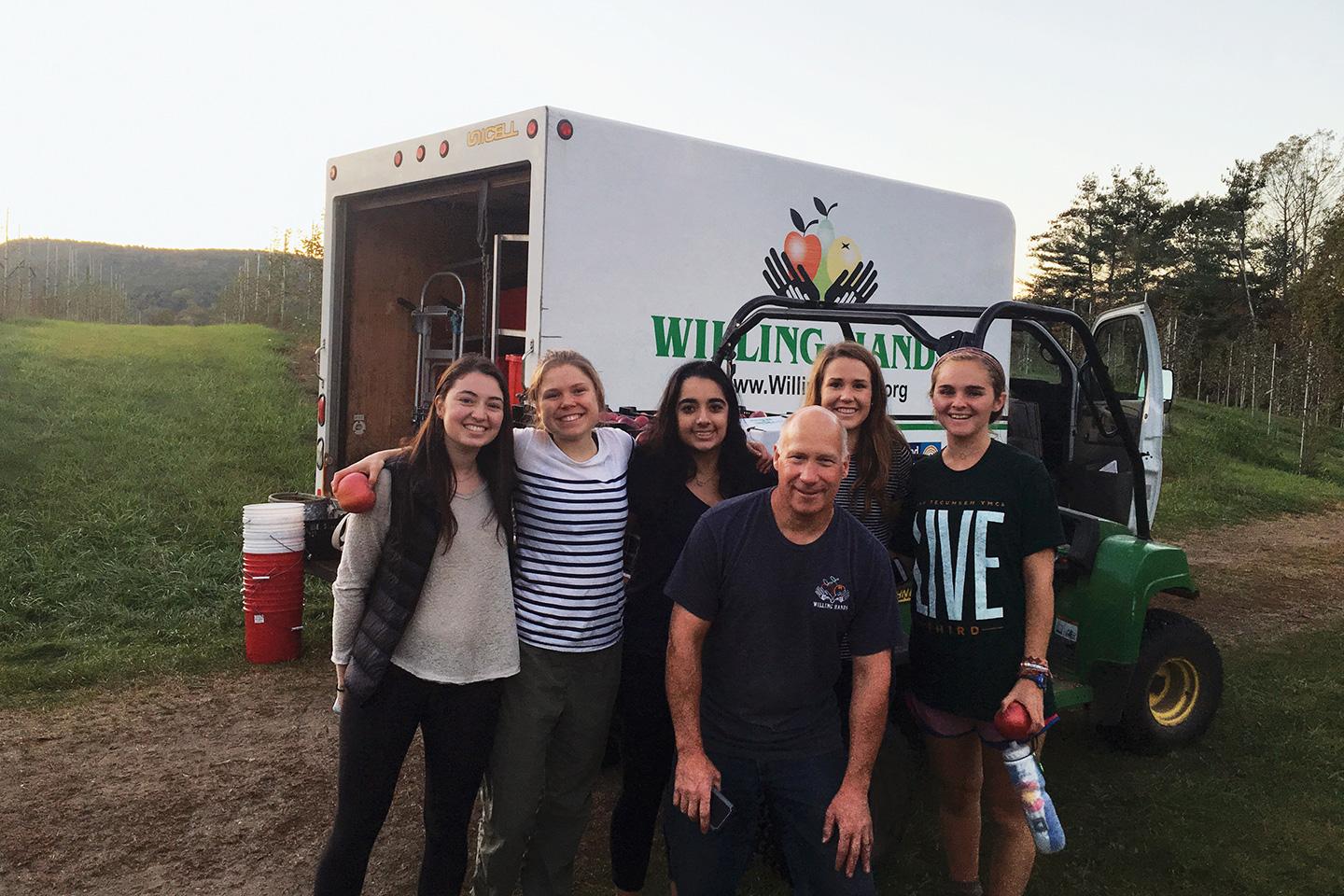“Dig In and Get Deeply Involved”
From rethinking culverts to getting food to people in need, students are developing leadership skills and making a difference in local communities

Extensive rainfall has been a gritty challenge for many northern New England communities during the past decade. In the Upper Valley, rainstorms are more frequent and more severe, washing out roads and bridges and damaging homes and businesses.
A group of students, including Laura Hutchinson ’19, explored this issue recently in the nearby community of Thetford, Vermont. They did this through a social impact practicum (SIP), an experiential learning component of their environmental studies course “The Practice of Science Policy and Diplomacy.”
Tackling a Local Problem
Laura interviewed experts in emergency response and resilience policy: Thetford town officials, firefighters, and emergency responders, and state policymakers to better understand the problem.
“I discovered that the parameters for road and bridge design simply were not adequate anymore because they don’t factor in climate change.” For their culminating project, Laura and her student team wrote a policy brief that urged towns to upsize their culverts, with the help of FEMA dollars, and to include the new practice in their town plans to reduce the number of washed-out roads and bridges in the future.
“It was exciting to see how our policy brief helped implement some new ordinances,” says Laura. “I learned a lot about how local policy happens. Interacting with local stakeholders on a local problem, in a real, tangible way, really enhanced my learning experience. It changes your view of the world when you’re outside, examining culverts, applying what you’ve learned.”
I discovered that the parameters for road and bridge design simply were not adequate anymore.
Real-World Impact, Hundreds of Students
SIPs, managed by Dartmouth’s Center for Social Impact, are a curricular way to integrate experiential learning and classroom learning and develop leadership skills. Created in response to President Philip J. Hanlon’s experiential learning initiative, they leverage Dartmouth’s teacher-scholar model of education.
The liberal arts curriculum they are learning in class has real-world impact.
The first SIP was a pilot project with “Geographic Information Systems 50” in the fall of 2016, where students learned GIS mapping in the field. Shortly after, the Dartmouth Center for Service conducted an extensive community needs assessment and found that Upper Valley organizations had needs that could connect with a wide range of courses across the undergraduate curriculum.
Since that first assessment, the program has been growing rapidly. To date, there have been more than 100 completed SIPs involving 30 community organizations and more than 400 students—covering courses in behavioral neuroscience, global poverty, public policy, Victorian literature, engineering, and studio art.
“There are a lot of social issues in the Upper Valley,” says Ashley Doolittle, associate director of the Center for Social Impact. “SIPs allow students to dig in and get deeply involved. They show students that their liberal arts education has real-world impact in all sorts of sectors right outside their door. Many faculty are also interested in how their research can be applied.”
Turning Ideas into Action
Oliver Edelson ’18, for his SIP in environmental studies, worked with Willing Hands, an Upper Valley food recovery nonprofit. Willing Hands takes excess food from grocery stores, wholesalers, local businesses, and farms and donates the food to people in need. Oliver was part of a student team that researched Vermont’s Act 148, which established a food recovery mechanism for businesses to follow.
Implementation of the policy had stalled, however, so Oliver and his classmates created a policy brief for state lawmakers to inspire businesses to distribute food in a more efficient way. In response, several businesses implemented new procedures to keep food out of the waste stream.
“We often hear the criticism that policy is just thinking and there’s no action, but this class showed me that policy can have teeth,” says Oliver. “It can have a huge impact when it works well. Even a little word change or adding another zero to something has a tangible impact on people.
“I think my project with Willing Hands demonstrated this clearly: If we push this policy brief forward and make even slight changes, more people are able to get the food that’s already there,” he adds. “Doing this was exciting.”
This class showed me that policy can have teeth.